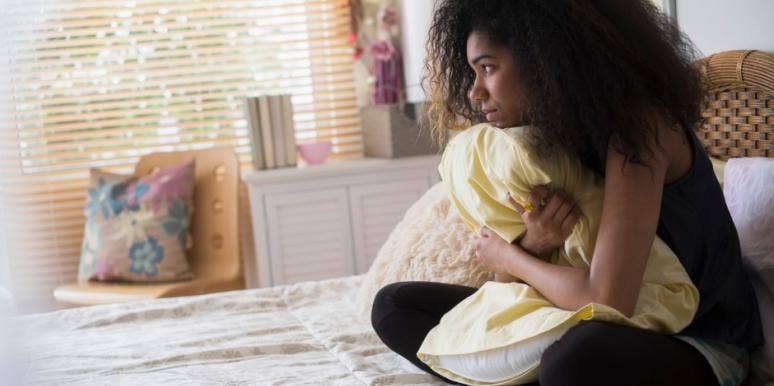3 Ways To Stop Feeling Guilty (Cause It's Making You Feel Crappy For No Reason)
Learn what to do instead of going on a guilt trip.
 getty
getty As a society, we are guilt-ridden.
Guilty for not calling or texting people back. Guilty for working and not spending time with our kids. Guilty for not getting work done when we are spending time with our family. Guilty for spending too much time on our phones. Guilty for that second piece of cake.
Are you seeing a pattern here? Me too.
Here's a quick and dirty overview on the difference between guilt and shame: Guilt means that I did something bad; shame mean that I am bad.
We can’t always be doing bad things. It’s just not possible.
Here are three ways on how to deal with guilt and start opting out of it (like you'd opt out of a telemarketing list):
1. Embrace your common humanity.
Common humanity is a piece and 1 of the 3 main components of Kristin Neff’s research on Self-Compassion. When we embrace common humanity, we realize that we’re not alone in our struggle, even though it absolutely feels like it at the time.
How many people have ever eaten too much cake? How many people have ignored their loved ones because they are engrossed in their phones? Whatever we are going through and beating ourselves up over is not unique — others have experienced it too.
We can grant ourselves a little slack that we are not the weirdest or rudest person. We just need to reach out and talk about it with someone non-judgmental for support, validation, and the "I’ve been there’s."
Sometimes embracing our common humanity is helpful and sometimes, it’s not. We are wired to think we’re the exception to the rule and we must be different from all those other humans.
You might think, "I have uncommon humanity, I know it." Think about how you feel when you buy a lottery ticket despite the odds and feel that you are really going to win this time. You think are the exception, or at least, you really want to be this time.
Condensed version: "I am not alone in my struggle or feelings of guilt; others have had them too, even if it seems impossible."
So, if it’s not a day where common humanity is a soothing idea to opt-out of the barrage of guilt, let’s talk about Radical Acceptance.
2. Radically accept yourself.
The word radical refers to being complete and total. It's when you accept yourself or a situation from the corners of your soul, in your mind, heart, and body. You are able to stop resisting and fighting it when you radically accept it. You are done fighting the reality of the situation.
When you say, "It is what it is", do you mean it? That's what radical acceptance is.
Marsha Linehan explains that "There are 3 parts to radical acceptance. The first part is accepting that reality is what it is. The second part is accepting that the event or situation causing you pain has a cause. The third part is accepting life can be worth living even with painful events in it."
Sometimes people resist radical acceptance because it feels like they need to punish themselves more or resist self-forgiveness. Just because we feel guilty and may have done something "bad", it doesn't mean that we’re always bad human beings at our core.
We all make mistakes. If we can accept that they don’t define our identity through radical acceptance, freedom and a guilt-free moment/hour/day/week will come much faster.
Condensed version: Accept the situation as it is, even yourself, without trying to change it.
3. Give yourself permission slips.
When we cling to old rules about how to do laundry, in what order to eat your meal, the exact way to fold a sheet, or the right way to edit a paper, we feel guilty when we break one of them.
We can use permission slips to get to a sense of relief. If you grant yourself permission to let go of something or not do something and don’t feel relief, it’s not the permission you need right now.
You know you need to give yourself permission when you say something like, "If I could only do... then I'd be able to do the project." Or, "I won't feel comfortable with this unless I do..."
Whatever you fill in the blanks is what you need to give yourself permission to do. There’s no one judging your permission slips for nobility, depth, or character. They are private.
If you need to give yourself permission not to do your laundry today or this week and it’s the biggest relief ever, you got it. And you don’t have to feel guilty about it. You have permission.
Condensed version: Grant yourself permission to let go of the old rules you're carrying around that inflict guilt.

